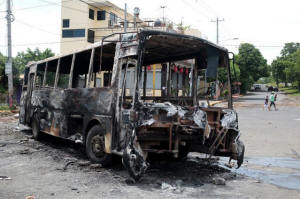|
Nicaragua's Ortega agrees to halt
violence, allow foreign probe
 Send a link to a friend
Send a link to a friend
 [June 16, 2018]
By Alonso Soto [June 16, 2018]
By Alonso Soto
MANAGUA (Reuters) - The Nicaraguan
government and civic groups on Friday agreed to halt all violence, in a
major step to end two months of political unrest that has left 170 dead
and rocked the government of President Daniel Ortega.
Ortega, however, did not address a call by Catholic church mediators to
allow for early elections next year to defuse the gravest political
crisis since the country ended a U.S.-fueled civil war in 1990. His
third consecutive presidential term is scheduled to end in 2021.
"The end of all violence is a basic necessity. Nicaraguans don't need
any more violence," Foreign Minister Denis Moncada, who is the head
government negotiator, told reporters.
Both sides will resume talks on Saturday to address the Church's
proposal to anticipate general elections and implement political
reforms.
The protests that began on April 18 have also left hundreds injured and
ground the economy of the impoverished Central American nation to a
halt.

Most of the dead were anti-government protesters who demanded the
resignation of Ortega, a former socialist guerrilla and Cold War-era
U.S. foe, blaming his administration for the violent crackdown on
demonstrations.
Civic leaders said they were satisfied with the agreement that included
setting up a international task force to investigate the killings during
the protests.
They also agreed for the gradual removal, under the supervision of
international organizations, of makeshift roadblocks that have snarled
traffic and curbed trade.
"This is a positive agreement that makes us think that violence will not
escalate," said Juan Sebastian Chamorro, a leader with the Civil
Alliance for Justice, the umbrella organization of civic groups.
[to top of second column]
|

A burned bus is seen during a protest against Nicaragua's President
Daniel Ortega's government at neighborhood in Managua, Nicaragua
June 15, 2018.REUTERS/Oswaldo Rivas

"If conditions are not met, then peaceful civic protests will
resume."
The talks, which resumed earlier on Friday after being suspended,
were marred by fresh violence in the capital, Managua, and
disagreements between negotiators over the international inquiry.
A Reuters witness heard gunfire and saw police advancing with
assault rifles in a neighborhood near a university campus.
University students have led demonstrations against what they say is
Ortega's growing authoritarian rule.
The Nicaraguan Center for Human Rights, which has monitored the
violence, said 170 people were killed in the eight weeks of clashes
between pro-Ortega forces armed with assault rifles and pistols and
protesters armed with rocks, slings and homemade mortars.
Ortega's surprise decision in April to slash pension benefits to
cover a widening social security gap triggered the deadly
confrontations, the bloodiest since the end of the civil war.
Ortega quickly abandoned the planned spending cuts. But the
subsequent violent crackdown on protesters fueled nationwide
demonstrations against Ortega, who has been in power for more than a
decade.
(Reporting by Alonso Soto; Editing by Anthony Esposito and Clarence
Fernandez)
[© 2018 Thomson Reuters. All rights
reserved.]
Copyright 2018 Reuters. All rights reserved. This material may not be published,
broadcast, rewritten or redistributed.
Thompson Reuters is solely responsible for this content. |